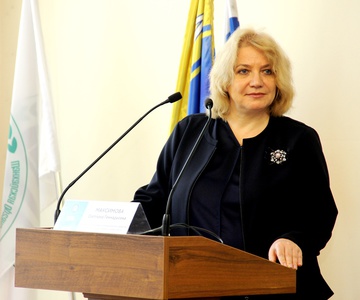Portal "Open Science": sociologists of Altai State University investigate the problems of migrant-phobia in Russia
 This article is based on sociological research conducted in the border regions of Russia in 2018 – 2019 by the research team of Altai State University, which was headed by Doctor of Sociological Sciences, Head of the Department of Psychology of Communications and Psychotechnology of the Institute of Social Sciences at Altai State University, Svetlana Maksimova.
This article is based on sociological research conducted in the border regions of Russia in 2018 – 2019 by the research team of Altai State University, which was headed by Doctor of Sociological Sciences, Head of the Department of Psychology of Communications and Psychotechnology of the Institute of Social Sciences at Altai State University, Svetlana Maksimova.
In the published work, sociologists of the flagship university of Altai Krai cite data that today Russia remains one of the leaders in international migration, ranking fourth in the world (after the United States, Saudi Arabia and Germany) in terms of the number of migrants on its territory. According to the UN for 2017, there were more than 11.6 million of them (in the US - 50 million, in Saudi Arabia and Germany - 12 million each) or about 8% of the country's population, which is 2.3 times higher than the global level.
The incomes received by migrants in Russia support not only individual households, but also entire states, making up a significant share in the structure of the GDP of the CIS countries - the leading suppliers of labor to Russia: only in 2017, personal contributions of labor migrants from Russia exceeded $ 20.6 billion, the income share of labor migrants, including those working in Russia, provided 35.1% of the GDP of Kyrgyzstan, 32.2% - Tajikistan, 20.5% - Moldova, 15.5% - Armenia.
Researchers of the flagship university of Altai Krai argue that the dependence of the Russian economy and especially demography on the results of international migration is great. However, the positive effects of international migration, obvious to demographers and economists, are far from so obvious to the host population. The presence of a significant number of migrants on the territory of Russia, the diversity of their life trajectories and plans create problems of adaptation of the population to new migration conditions, increase the risk of polarization of society, its division into "us" and "others", which necessitates studying the perception of labor migrants by the host population.
“Negative attitudes and prejudices on both sides are caused, first of all, by the lack of knowledge and experience of cooperation, and their overcoming is possible thanks to joint actions encouraged by the authorities,” says Svetlana Maximova. “Our study confirmed the prevalence of negative stereotypes and prejudices among the population: from 30% to 40% expressed a high degree of agreement that migration leads to the worsening of the crime situation, harms interethnic relations, and leads to the erosion of traditional Russian culture and way of life. The speculation in the media that migrants are carriers of infections and diseases was of serious concern. At the same time, the population practically does not share the convictions, which are obvious for the scientific community and political elites, that migration makes it possible to fill the shortage of qualified specialists and improve the demographic situation, increase cultural diversity, and Russia's openness to new ideas and cultures".
The research of Altai State University scientists emphasizes the importance of combating ethnic prejudices and migrant-phobia and the need to form a positive public opinion for the effectiveness of migration policy, which corresponds to national interests in attracting foreign human and cultural capital.
According to sociologists of Altai State University, the experience of personal interaction of the indigenous population with migrants is not sufficient for the formation of stable positive attitudes towards migration. An important role here play the systemic nature and intensity of intercultural communication, which depend on the general migration situation in the region and the nature of the dissemination of this topic in the media.